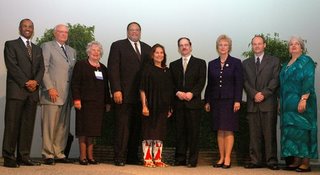On Baha'i Political Thought: Baha'i elections as a non-partisan form of democratic appointment of government
 The National Spiritual Assembly of the Bahá'ís of the United States, elected in 2005. Photographer: Eric Van Zanten. Baha'i Media Bank. Photo originally in http://news.bahai.org/story.cfm?storyid=372
The National Spiritual Assembly of the Bahá'ís of the United States, elected in 2005. Photographer: Eric Van Zanten. Baha'i Media Bank. Photo originally in http://news.bahai.org/story.cfm?storyid=372
I voted. Actually I voted twice. Once in a recent bi-election to fill a vacancy on the local Baha'i Spiritual Assembly that came up when a member of the Assembly left to pioneer to China, and then in our District Convention to elect our delegate to the National Convention who will participate in the election for the members of the National Spiritual Assembly. Both elections were spiritual experiences for me.
It's the political season in the United States with national, state, and local elections in less than two weeks. I will be voting in these elections, too.
As I listened to National Public Radio this morning in the car, I heard a story about a controversial political "attack ad," one of many airing this year across the country. It reminded me why I am glad to be a Baha'i.
One of the best discussions about "Baha'i political thought" is contained in the remarkable defense of the Faith entitled Making the Crooked Straight: A Contribution to Baha'i Apologetics that devotes a chapter to the subject. Under a heading entited "On the Way to a New Type of Politics" are these sub-headings: 1. The concept of politics in Baha'i scripture
1. The concept of politics in Baha'i scripture
2. Loyalty to state authority
3. Baha'i elections: a non-partisan form of democratic appointment of government
4. A new model for political decision-making
5. Responsibility for the world we live in
Here is an excerpt from the discussion. -gw
Elections in the Baha'i system are not a struggle for political power conducted within the bounds of formal constraints. It is not the aim of Baha'i elections to measure support for rival manifestos or to represent different interest groups in a political contest. In Baha'i elections there is no nomination of candidates, no electoral propaganda, and no campaigning. Factionalism and partisanship are prohibited. It is not the aim to have one's interests represented, nor to express a preference for certain policies or political ideals, but rather to select the most suitable individuals. Baha'i elections are concerned solely with choosing personalities. Their goal is to elect those people to decision-making offices who will not concentrate on their own interests but will cooperate with their fellow members to promote the general good. Election to such an office is not a right to which an individual is entitled by virture of any special achievements, his material standing, his education or any other attributes; neither is it an honour to be striven for, and it is most definitedly not a means of satisfying one's power instincts: 'In a Baha'i election no one is trying to be elected.' Therefore, in the criteria given in the scripture for determining the suitability of an individual for electoral office priority is placed on the person's qualities of character. Only someone who is 'upright', 'loyal', 'honest' and free of 'prejudice, passion and partisanship' can hope to meet the requirements of Baha'i consultation.
Ulrich Gollmer, "Baha'i Political Thought" in Making the Crooked Straight: A Contribution to Baha'i Apologetics, pp. 472-3

1 comment:
Hi George, do you give me permission to post part of this in a note on my FB page?
Post a Comment